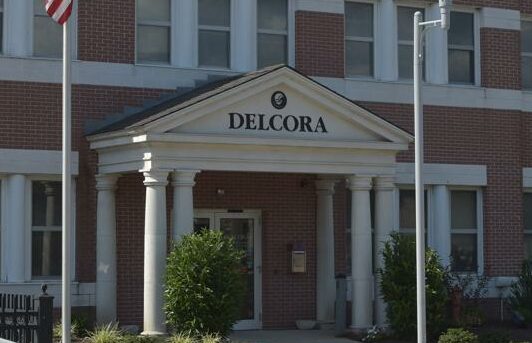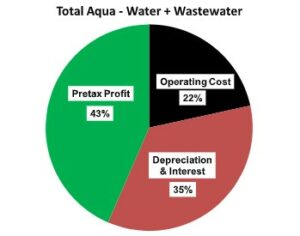OPINION: Municipal Sewer And Water Customers: Beware of Big Water!

Delaware Valley residents are being confronted with Aqua Pennsylvania and Pennsylvania American Water driving a frenzy of acquisitions to take over municipal sewer and drinking water operations. This is 100 percent money-driven – Big Money, Big Profits, all paid for by the utilities’ customers.
The Pennsylvania legislature and Public Utilities Commission (PUC) have combined to create this acquisition frenzy. In 2012 the legislature allowed Big Water companies to dump much of the cost of their acquisitions on existing customers who have no connection to the acquired systems. Then in 2016, the legislature gifted Big Water the ability to pay highly inflated prices for municipal systems.
Regulated utilities generate profits from a return on their investments. As illogical as it sounds, Big Water is eager to pay the inflated acquisition prices because the more they pay, the greater their profits.
The PUC has to certify that these acquisitions provide a “public benefit.” They seem to have a simple definition of “public benefit”: Economy of Scale ‑ Good; Big Water ‑ Good; Municipal system ‑ Bad. “Economy of Scale” is so important that it can justify a doubling of the customer’s cost. Think about that – “economies” that double your cost is a “public benefit.” Does that make sense to you? It does to the PUC. The PUC has yet to deny any of these acquisitions.
Buying municipal systems is a major strategic focus for Aqua and American. They have very deep pockets and are pouring hundreds of millions of dollars into the acquisition feed trough. Unfortunately, many municipal politicians are the hogs flocking to the trough to get what they see as “free” money.
Big Water uses a well-practiced sleight of hand to entice these politicians. They make the deal sound so sweet. They start with a huge candy jar full of money emphasizing no tax increase – a hot button for any politician. Then there is scaremongering about the costs of repairing a decrepit system and misleading claims that Big Water can fix it cheaper. Finally, there may be promises about mitigation of future rate increases. Promises that so far have always been broken. The reality is that the customer is on the hook for the entire sale price.
The elephant in the room that Big Water tries to cover up is their profits. They want you to visualize that their sliver of profit is no big deal.

The following chart destroys that sliver image. It is Aqua PA’s proposal from its August-2021 rate filing. It is not seeking a sliver of profit but wants the hog’s share of the pie! They propose that 43 percent of our water and sewer bills should go to their profits. Municipal systems are non-profit operations. Therefore, when Aqua acquires a system, a 75 percent rate hike is required just to fund its profits. Higher depreciation and interest costs push rates up even more.
Delaware Valley residents are facing all these issues with Aqua Pennsylvania trying to buy DELCORA’s sewer operations for $276 million and the drinking water operations of the Chester Water Authority (CWA) for $410 million. Both deals involve political agendas.
For DELCORA, there is speculation that the political incumbents are maneuvering to increase the purchase price. There is also an issue of facility improvements that DELCORA claims could cost $1.2 billion. Such numbers are usually grossly over‑stated scare tactics. But one thing is certain: the customer is far better off when non‑profit DELCORA makes the investment. If Aqua closes this deal, the cost to its customers will go up. Depending on the investment, it could be a modest 17 percent, or it could double or even triple. It is certain that Aqua will be the high-cost result for DELCORA’s customers.
The sale of CWA is supported by Gov. Tom Wolf as a bailout for the bankrupt City of Chester. Politically, that stinks. It is trying to hide a large backdoor “tax” on CWA customers – a small segment of Pennsylvania’s population. If the state wants to bail out Chester City, let it appropriate state funds and have all of Pennsylvania pay for it. Of course, that would be politically toxic.
CWA is a large well-run system. Aqua brings nothing to the table that CWA does not already have. If this deal goes through, the cost to its customers will double just to fund Aqua’s profits. The PUC approving this deal would be definite proof of its failure to have an understanding of what “public benefit” means.
If your municipal system is the target of a Big Water takeover, you need to take action. Assume the sales pitch is all hogwash. Start asking tough questions and do not accept mumbo-jumbo answers. Put pressure on your municipal officials to stop the takeover. Many officials only see the candy jar full of money and they are not on your side. Demand a place at the bargaining table. The ratepayer has been the pawn in this Big Water, Big Money acquisition frenzy for too long.
Follow us on social media: Twitter: @DV_Journal or Facebook.com/DelawareValleyJournal


